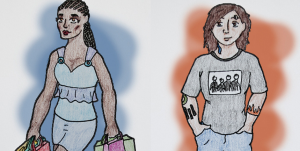
IndieGoGo
(Content Warning: Sexual assault)
Healing after sexual trauma can be an erratic, draining and difficult process. It can also be extremely rewarding and empowering.
This tumultuous journey takes an immense strain on survivors of sexual abuse. During this time, the survivor’s loved ones can feel disempowered if they do not know how to be supportive. The romantic or sexual partner of a survivor might find it particularly difficult to be an effective source of support, as romantic and sexual contact could be triggering for survivors.
While it is common for the partner of a rape survivor to feel helpless, there are many ways that they can be an excellent source of support.
Here are a couple of ideas to consider when attempting to support your partner with their sexual trauma healing.
Understanding Rape Trauma Syndrome
Rape is, by definition, non-consensual sex. However, on a psychological level, it is so much more than that.
It is an invasion of one’s bodily autonomy. It is a physical violation of one’s personal space, which uses an intimate form of human contact in order to assert authority over another body.
It is important to understand that a trauma of this magnitude severely compromises the psychological health of the victim. For this reason, it is helpful to educate yourself on Rape Trauma Syndrome (RTS), which affects almost all survivors to some extent.
RTS is a general term for the response a survivor has to being raped. It is a normal, common and healthy reaction to the trauma, and is experienced differently by every survivor. It’s not a sign of weakness or abnormality.
Psychological symptoms include depression and anxiety. A survivor may experience a range of emotions, including guilt and shame, hopelessness, numbness, helplessness, loneliness, anger and fear. Memory loss and confusion can ensue.
RTS can also result in nightmares, panic attacks and flashbacks of the abuse. The survivor might sometimes be consumed by the thought of their abuse to the point where they are unable to concentrate on anything else.
With support and care, a survivor can ‘heal’ and minimize the effects of RTS. This is not to say RTS will simply ‘go away’, but rather to say that it can be managed.
Communication
It’s important to remember that everyone’s experience and healing process is unique. We can never tell a survivor what they are feeling or what they should do. They need to go at their own pace, taking steps only when they feel ready.
A survivor is the one person who will understand their healing process the best.
As the act of rape involves a rapist assuming control over a victim’s body without their consent, it is extremely important that the survivor is able to control their own healing process. Allowing a survivor to make their own choices goes a long way in rebuilding trust as it demonstrates that you respect their autonomy.
And, because the healing process differs for each individual, you could never anticipate exactly how the survivor wants to be supported. Rather, the survivor needs to tell you. For this reason it is crucial that good communication is practiced.
Many survivors go through a stage where they appear to not want to deal with their trauma. They might deny it happened as they want to forget it, or they might want to process what has happened themselves before discussing it with someone else.
This is a common part of the healing process. Do not pressure them into talking to you. Rather say gentle, encouraging statements, such as:
- “You’ve gone through something traumatic, and I want to let you know that I’m here to listen to you if you ever want to talk about it.”
- “I know you’ve experienced something difficult. Let me know when and how you would like me to support you.”
- “I’m ready to listen to you and support you if you need me. I will not judge or blame you for what happened to you.”
When a survivor speaks to you about their trauma, listen carefully and do not judge them. This will help you build a sense of mutual respect and trust.
A number of rape survivors are afraid of becoming defined by what had happened to them. For this reason, it’s important their trauma is not a constant focus of the relationship.
They were full human beings before their trauma, and they still are full human beings, even if their trauma seems to consume them at times. Let them know that you do not think of them as only a ‘victim’, but as a wonderful/open-minded/loving/kind/warm person who endured something traumatic.
Counseling
Some survivors might be apprehensive about going to counseling for a number of reasons. Some might want to forget the incident has happened. Others might feel afraid of reliving or retelling the experience. Sometimes, they are simply not ready to process what has happened to them.
All of these reactions are normal and common. After some time has passed, they might feel able to discuss what has happened to them.
Pushing a survivor to go to a counsellor can be counterproductive.
Firstly, forcing the survivor to do anything could make them feel as if they aren’t in control of their recovery.
Secondly, making a survivor go to counseling could be interpreted as telling the survivor that something is wrong with them. As our society stigmatizes mental and psychological illness, insinuating that the patient is mentally ill can be very offensive and traumatic. In reality, RTS is a common and healthy way of dealing with the trauma that should be managed with support.
If the survivor doesn’t want to go to counseling yet, it can be helpful for you, the partner, to attend counseling. This will help you manage your own feelings and learn how to support the survivor.
If a survivor decides to attend counseling, you could support their decision in a number of different ways.
Counseling can bring up some painful memories and the survivor might need extra support at these times. For this reason, it could be helpful for you to accompany them to counseling.
You could also check in with the survivor after the session and ask if they would like to discuss it.
It’s important to bear in mind that the survivor might discuss things with the counsellor that they do not want to discuss with you, and this needs to be respected. Pushing for information could be counter-productive.
(Re)building Sexual Relationships
As the survivor had the traumatic experience of having sex used against them, the idea of having sex could be terrifying. If you are sexual people, and you’re in or are entering a sexual relationship, the topic of sex can be difficult to deal with.
For some survivors, the sexual touch of someone they trust can have a profoundly healing effect. For others, it can be extremely traumatic. This is largely dependent on the time lapsed since the event, the nature of the event, the support the survivor has received, and whether they feel comfortable with the partner.
Once again, communication is important. If the rape occurred recently, it might be helpful to wait a while before broaching the topic of sex. The timing depends on how comfortable the survivor is.
When both parties feel comfortable enough to discuss it, you should discuss how to approach sex in a way that allows the survivor to feel totally in control. Discuss which acts they would like to avoid and which types of touch are difficult to bear.
It is usually best for the partner to be patient and let the survivor initiate sex. As always, it is of the utmost importance to obtain clear and enthusiastic consent. Remind the survivor that you will stop as soon as they want.
During sex, ensure that they are feeling happy and safe. By using casual phrases to check in on them, you can gauge how they are feeling without making them feel as if you are treating them with kid gloves – something which survivors could find frustrating, disempowering and patronising. You could ask things like, “Are you enjoying yourself?”
If they seem uncomfortable, say something like, “You seem uneasy. Would you like me to stop?” or “You don’t look like you’re enjoying yourself. How can I make you feel more comfortable?”
Constant, honest and open communication is key in any sexual relationship, but it is particularly important when your partner has survived sexual abuse. Make a point of prioritizing it.
Triggering
Many survivors can be triggered by certain things that they associate with the rape. This is to say that certain things can cause them to relive the experience of being raped, or to have flashbacks, nightmares, or panic attacks.
Triggers can also cause the survivor to experience other aspects of RTS – such as depression, anxiety and insomnia – more intensely.
A trigger could have an immediate effect or a delayed effect. It can affect the survivor for a short period of time, or it could start the onset of a long period of intensified depression and anxiety.
Triggers differ for every survivor. I’m personally not as affected by descriptions of rape as by victim-blaming or rape jokes. I’m also triggered by a song I associate with that day, and an unfortunately common wall decoration that was in the room where I was raped. Some might be triggered by smells and places they associate with their rape. Others might be triggered by the anniversary of their rape. Sexual touch can be triggering for many survivors.
If triggered, the survivor should be able to indicate that they’re feeling unsafe or uncomfortable. The partner should stop doing whatever they are doing, if that was the trigger.
The next priority should be to comfort the survivor. Ask the survivor what you could do. Some survivors want to be left alone, while others prefer being held. It could be helpful to distract the survivor by telling a story or singing.
Many survivors manage panic attacks by picturing a ‘safe space’ and it could be helpful for the partner to describe this safe space. The partner could also encourage the survivor to describe the safe space to them.
I encourage all survivors to try out different techniques in managing triggers – there is definitely no one-size-fits-all glove that comes with healing after trauma.
Once the survivor feels safe enough to discuss it, it could be helpful to talk about what triggered the survivor and how this could be avoided in future. To broach the topic, you could use phrases such as, “You seemed upset back there. Would you like to talk to me about what happened?”
Often, a survivor will feel guilty about interrupting sex. They also might feel frustrated at being triggered as it feels completely out of their hands. Let the survivor know that it is not their fault that they triggered, and that it is a natural reaction – like sneezing in a dusty room.
Remind them that they need to heal at their own pace and that you will support them throughout the process.
Take Care of Yourself
Many people think that the loved ones of a survivor do not need support as the trauma did not happen to them. However, seeing someone you love endure such a trauma can be difficult.
As men are socialized to believe their value is linked to their ability to protect their loved ones, many men might feel a sense of emasculation as they feel that they have failed to protect someone they love.
Acknowledge your feelings and find support.
While it is definitely important to express your feelings to the survivor, it could be difficult for them to be confronted with your trauma if they have difficulty managing their own.
Because of this, it is useful to seek support from other individuals, such as a counsellor, family, friends, or a community leader who you trust.
***
As a rape survivor who has been in supportive – and non-supportive – romantic relationships, I believe that being a supportive partner boils down to three things: awareness, communication, and compassion.
Sexual trauma recovery is a bumpy road, but with those three priorities, you can help your partner on that journey.
Useful Resources:
A special thank you to Rape Crisis Cape Town for assisting in the research for this article.
Take a look at RAINN’s list of international sexual assault resources to find support in your region.
[do_widget id=”text-101″]
Want to discuss this further? Visit our online forum and start a post!
Sian Ferguson is a Contributing Writer at Everyday Feminism. She is a South African feminist currently studying toward a Bachelors of Social Science degree majoring in English Language and Literature and Gender Studies at the University of Cape Town. She has been featured as a guest writer on websites such as Women24 and Foxy Box, while also writing for her personal blog. In her spare time, she tweets excessively @sianfergs, reads about current affairs, and spends time with her gorgeous group of friends. Read her articles here.
Search our 3000+ articles!
Read our articles about:
Our online racial justice training
Used by hundreds of universities, non-profits, and businesses.
Click to learn more
Most Read Articles
- « Previous
- 1
- …
- 30
- 31
- 32



















